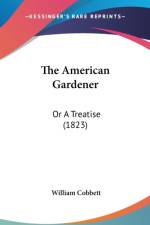von William Cobbett
26,00 €
In the passage which I have just quoted from chap. xxxi. of ECCLESIASTICUS, it is said, that 'wine, measurably taken, and in season,' is a proper thing. This, and other such passages of the Old Testament, have given a handle to drunkards, and to extravagant people, to insist, that God intended that wine should be commonly drunk. No doubt of that. But, then, he could intend this only in countries in which he had given wine, and to which he had given no cheaper drink except water. If it be said, as it truly may, that, by the means of the sea and the winds, he has given wine to all countries, I answer that this gift is of no use to us now, because our government steps in between the sea and the winds and us.-from Advice to Young MenSon of an innkeeper, former soldier, champion of the working class, early anticorporate activist, and member of Parliament-William Cobbett experienced life to its fullest, and in this 1829 work, he shares the wisdom of his years with the youngsters of Britain. His advice encompasses:. why it's best to be civil but never servile. why education should be "by no means... despised". why a young man should not sport with the affections of a young woman. why it's best to avoid buying anything on credit. why it may be wise not to introduce servants into your household. why it's necessary to cure the vices of wives as soon as possible. why a father should strenuously oppose the smallpox vaccine for his children. why book-reading is wholly detrimental to young women. and much more.This quaint and charming lost classic will amuse readers young and old alike.Also available from Cosimo Classics: Cobbett's Rural Rides, Volumes 1 and 2.British journalist and radical WILLIAM COBBETT (1762-1835) published the weekly newsletter Political Register and is also the author of The Progress of a Ploughboy to a Seat in Parliament (1830).


















